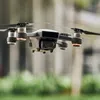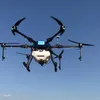Inside the drone zone: How drone startups are meeting the demand for talent
The drone industry is witnessing a spurt in demand for talent across roles and functions. With demand outweighing supply, what are drone startups doing to attract and retain employees? YourStory spoke to startups and employees to understand the ground reality.
When Surya Ravi took up a job as a drone pilot for a land-survey drone startup, he wasn’t sure what it entailed. He thought he would try it out for a year before deciding further. And now, a month later, he says he wants to be a drone pilot for “many years”.
After working in the engineering and sales functions at leading companies, Surya, who has a master's in technology, says he has finally found “happiness” as a drone pilot, as he is passionate about aeronautics.
For people like Surya, the emerging drone industry spells a lot of possibilities for career growth. From land surveys and border surveillance to spraying disinfectants over farmlands and rescue operations, the applications of drones are vast. This has led to a spurt in demand for talent for various roles and functions.
Surge in demand
In August last year, the central government introduced Drone Rules, 2021 to regulate the drone sector. These rules and subsequent policies have provided a tremendous thrust to the sunrise industry and pushed the need for talent.
According to a civil aviation ministry estimate, India’s drone sector will reach a turnover of Rs 12,000 crore to Rs 15,000 crore by 2026, from about Rs 80 crore now.
Earlier this year, the civil aviation minister, Jyotiraditya Scindia, had said that he expects one lakh people to be employed by the drone industry in the next five years in the country.
According to an estimate by talent supply agency TeamLease, the drone industry already employs 20,000-25,000 people and is poised to reach 100,000 jobs in FY2022. This includes jobs in drone service firms as well.
Tenders for drone services
One of the reasons for this surge in the demand for talent could be the large tenders that the central government has been floating for drone services.
Take, for instance, the SVAMITVA scheme to survey villages using drones to build comprehensive property records. Delhi-based Omnipresent Robot Tech, a land-survey drone startup, has applied for two Rs 50-crore tenders in Karnataka and a Rs 120-crore tender in Andhra Pradesh under the scheme.
Describing the opportunities in government tenders, Aakash Sinha, CEO of Omnipresent, says, “We are trying to close deals that are 10x-20x our (current) revenue.”

Skill requirements
While there is a huge demand for people, it is important to recognise the skill gaps in the industry, across functions and roles.
Manufacturing startups need good designers and technicians, while operating startups need trained pilots and software engineers. And startups in the B2B and B2G (business to government) space need experienced business development and operations people.
There are two challenges that drone startups face. One, they need to hire rapidly from a workforce that is not trained for the industry’s specific requirements. Two, they have to confront the challenge of existing employees being poached by competition.
To overcome these hurdles, startups have to attract potential candidates and retain existing employees with strategies beyond salary packages.
Hire them young and train
According to Aakash, surviving and growing at a decent rate in the drone industry is not a problem right now. The question is whether one can emerge a winner by getting the best employees, he says.
YourStory spoke to a few startups to understand their hiring strategies. Most of them said the key hiring objective is to onboard smart, interested college students and train them in-house.
Omnipresent has launched the Drone Centre of Excellence in collaboration with Noida-based Gautam Buddha University to provide one-month training to B. Tech graduates. Apart from training pilots, the centre also trains engineers for data processing roles that complement the job of pilots.
“We are training our own pilots, engineers, people who can repair, test, fly the drone and maintain it,” says Aakash.

Bengaluru-based Skylark Drones, which provides backend software and analytics support for drone service providers, follows a similar blueprint for hiring. It pre-empts the problem of lack of talent by picking software engineering students, while they are in college, after a rigorous entrance test.
According to Mughilan Ramasamy, CEO of , college interns, who are later hired as employees, tend to stay longer and some of them are even part of the company’s core team.
IIT-Kanpur incubated EndureAir, which builds logistics drones for military usage, also believes hiring young people and training them is the way to go.
However, in-house technical training has its share of difficulties.
According to Prateek Srivastava, CEO of Pune-based Aerials, it is challenging to find instructors certified by the Directorate General of Civil Aviation. He says there are very few institutes training instructors and the frequency of the batches is also low.
According to the government’s DigitalSky platform, there were only 307 certified instructors as of July 29, 2022.
Spot the right talent
Founders of drone startups recognise that they cannot always match the salaries offered by competitors from other well-funded tech sectors. So, it is imperative for them to find employees who are interested and naturally inclined towards the drone space.
“It all depends on whether the engineer wants to work in the drone space,” says Skylark’s Mughilan.
Sucharita R, Lead GIS Consultant at Skylark, is one such person who is passionate about the field. Six years ago, when she was studying civil engineering in Bengaluru, she took up a course on the use of software in drone technology.
When Skylark visited her college on a recruitment drive, Sucharita's interest in geo-spatial technology, which the company was experimenting with, caught their attention and helped her land a job at Skylark.
“I get a lot of freedom in the sectors I want to work in, the solutions I want to develop, the way I want to do it,” says Sucharita.
Create an enabling work culture
To create an enabling work environment, EndureAir says it offers flexible hours, remote-working opportunities, women-friendly policies, and an open-door policy across hierarchy to allow discussions on employee issues. The company says it also tries to match salaries across roles for new hires, wherever possible.
Many startups are also leaning into employee referral systems to build their teams.
DroneAcharya Aerials has a referral programme called ‘Find Another You’. It provides bonuses to employees who successfully refer someone. The company’s CEO says this provides employees an opportunity to grow, helps retain existing employees, and entices new employees.
The company claims to have never had an employee poached by another drone startup. It hired 27 people in 2022 and is looking to hire another 45-50 people soon.
ideaForge, one of India’s oldest drone startups, believes referrals lead to higher conversions because candidates are more aware of the standard of work expected at the company and are more likely to fit into the work culture, due to their rapport with existing employees.
Build trust to attract talent
Agritech drone startup Garuda Aerospace was the first company to sell drones subsidised by government loans. It has also expanded into Africa. The startup has spoken widely about its strategies and expansion plans, thus building trust among people and attracting potential employees.
After Prime Minister Narendra Modi launched a 100 Garuda kisan drones simultaneously in 100 villages in February, the company saw huge interest from potential employees. It received 7,500 job enquiries, following the televised launch of the drones.
Agnishwar Jayaprakash, CEO of , says the company has also hired employees from large firms such as , , Tata, and Mahindra. Garuda hired 120 people this calendar year and plans to recruit 300 people over the next quarter.
Accept the reality
The reality is demand outweighs supply, leading to poaching attempts from competing startups. The entry of companies such as Reliance, Adani, and Rattan India, via partial acquisitions and large investments, is also adding to the employee churn.
Munira Loliwala, business head at TeamLease, says some of the drone clients she manages have witnessed poaching attempts from competing firms. According to her, positions with scarce skills (such as CAD designing) are seeing remuneration hikes of 35-40%.
Skylark’s Mughilan admits he has lost employees to salary offers that were two to three times more than what they were making.
The company is witnessing employee tenure getting shorter, especially for people in operations and business development, who are often poached by large corporations. Mughilan says it used to see a four-year tenure for employees earlier, but now they are likely to stay only for two years. He expects this to reduce to just 12 months soon.
However, he says, startups can combat the challenge by recognising employees’ right to leave for salary hikes. Startups must brace themselves for employee turnover and be prepared for departures with pre-emptive hiring of juniors.
To fend off interest from outside, Omnipresent has started providing stock options and equity to retain its senior core staff.
According to Aakash of Omnipresent, drone startups are facing good problems that indicate the industry’s real growth potential and demand.
For now, drone startups seem to have taken off with confidence, with talent by their side. Whether they can soar successfully, with enough hands on deck, remains to be seen.
(The story has been updated to correct a name.)
Edited by Swetha Kannan









